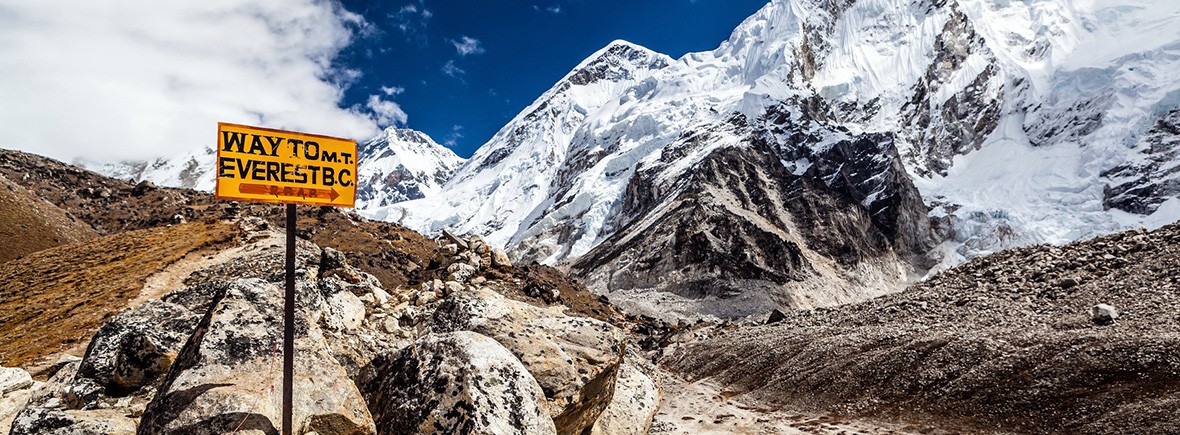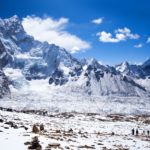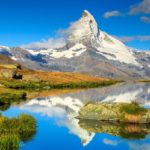DJ Paul Oakenfold just played a gig at Everest base camp. Was this an innovative way to raise money for charity, or a narcissistic PR stunt?
British DJ Paul Oakenfold, 53, made his name in the 1990s on the UK dance music scene. He has won two Grammys and is credited with sparking the Second Summer of Love in Ibiza in 1997, supposedly the biggest revolution in British youth culture since the original Summer of Love in 1967.
On 11th April this year, he hosted a dance party at 5,380m (17,600ft) above sea level after completing the popular 10-day trek to Everest base camp in Nepal. Portions of the DJ’s set were streamed live on Facebook.
The event has been widely covered in the media with nearly all outlets leading with the DJ’s name along with the headline or tagline “highest party on Earth” or something similar.
Personally, I can’t think of anything worse. I love the mountains and the outdoors because they offer a way to escape the noise and commotion of modern life. The thought of the wilderness and its nature being disturbed by a dance party seems bafflingly inappropriate. Surely the place for dance parties is the nightclubs of London and Ibiza or Dubai and Istanbul?
Perhaps I’m just being a curmudgeon and beginning to show my age. After all, if Mr Oakenfold is doing this for a good cause then a few hours of disturbance in a remote region of the Himalayas is acceptable, right?
For a good cause?
According to media coverage, Oakenfold’s aim was to draw attention to the effects of global warming and raise funds to help survivors of the 2015 Nepal earthquake, which killed nearly 9,000 people and left thousands more homeless.
What remains unclear is how this event is achieving those objectives. In a video on the BBC website, Oakenfold describes the event as “for a good cause”. Elsewhere, he says: “I want to support in the rebuilding and to shed light on the environment… I would like to do my bit.”
Other reports mention that proceeds from his tour will go to Supporting Nepal’s Children and Himalayan Trust UK, and that his Denon-brand DJ equipment will be donated to a local DJ school in Kathmandu. As yet, no details have been released as to how much the Everest party has raised or intends to raise for these charities.
Despite these perfectly magnanimous gestures, the cynic in me wonders if Oakenfold’s Everest party had more to do with promoting his latest project, SoundTrek, and its associated tour and album than helping Nepal’s underprivileged.
Brought coloring books & pens to give to the local children of Khunjung on behalf of #SoundTrek and one of our key charities @Nepalschildren pic.twitter.com/B0NZEbIT0v
— Paul Oakenfold (@pauloakenfold) April 4, 2017
I thought that perhaps I was missing something so I checked out Paul Oakenfold’s website. I couldn’t find a single reference to the charities he’s supporting. The only mention (which you have to really search for) is an embedded tweet (above) from his Twitter feed which will no doubt get lost over time.
Even the Soundtrek Facebook page doesn’t appear to mention fundraising or raising awareness. This is from their ‘About’ section:
“Soundtrek is a series of adventures to the world’s most awe-inspiring locations to showcase music cultures from around the globe, starting with Mt. Everest.”
Then: “Paul Oakenfold continues his pioneering role withing [sic] the electronic dance scene, this time taking the musical medium to the far corners of the earth, starting with Everest!”

An exercise in narcissism
Climbers on Everest already face accusations of narcissism. There’s the image of the wealthy banker who buys his way up the highest mountain on Earth, or the extreme mountaineer who’s keen to bag another peak. Such motivations are less than ideal, but at least these climbers are there to engage with the outdoors – not to pursue an ambiguous quest to ‘showcase music cultures from around the globe’.
I fear that Paul Oakenfold and SoundTrek are more concerned with headlines and hashtags than helping the children of Nepal. There are plenty of ways to raise money for these causes other than flying halfway round the Earth, hauling music equipment into the highest mountain range in the world and banging out dance music in a usually silent part of the planet.
Oakenfold’s quote in Outside magazine is fairly illuminating:
“I’ve played all of the main festivals and all of the main stages and clubs, and don’t get me wrong, they are great, but they start to feel all the same … Everest opens exciting new doors and that is what inspires me. It allows me to be challenged at this stage of my career and really think about my legacy.”
Basically, he got a bit bored and is looking for something new? I find it hard to believe that reducing global warming was the motivation for his expedition. Indeed, in the same article, he explains: “We had to have [our equipment] shipped, then driven, then put on a helicopter and transported by a team of Sherpas.”
Hasn’t Everest suffered enough commercialism and drama in recent years without being turned into Ibiza at altitude, even if it is ‘just’ for a day? By all means, if Oakenfold wants to trek to Everest base camp – or anywhere for that matter – and raise money for good causes along the way, then I support and actively encourage it.
Likewise, if he wishes to donate proceeds from his latest gigs to charity, I would thoroughly support him and admire him for his generosity. But, please, can you do it in a nightclub and not on the side of a mountain?
Personally, I think Simon Lowe, Managing Director of expedition company Jagged Globe, puts it best:
“To be honest, it makes me want to vomit – but then I go to the mountains for their beauty and tranquillity rather than for narcissistic reasons.”
Into Thin Air: A Personal Account of the Mt. Everest Disaster is the true story of a 24-hour period on Everest which started with a storm and ended with the worst single-season death toll in the peak’s history.










